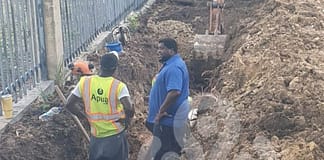
The Food and Agriculture Organization (FAO) in collaboration with the University of the West Indies (UWI) under the FAO-UWI Transformational Agri-Food Systems Project, a fact-finding Mission was undertaken by two members of the consulting team (Erica Haughton-Project Coordinator, and Dr. Dale Rankine- Lead Consultant) to Antigua & Barbuda.
The first phase of the project was a mission which was convened over the interlude December 4-8, 2022, and was ably coordinated by the Inter-American Institute for Cooperation on Agriculture (IICA), Antigua & Barbuda, with support from the Ministry of Agriculture, Fisheries & Barbuda Affairs. A total of 25 face to face consultations were undertaken with key stakeholders (including field visits).
Overall, the mission was successful and allowed the team to ascertain a key understanding of the nuances of the agriculture sector in Antigua & Barbuda. The range of stakeholders met was diverse, and meetings were well attended. All participants were very hospitable and where face to face meetings were not possible virtual platforms were utilized.
As a result from this fact-finding mission, a national consultation (second phase) was held in Antigua with key stakeholders and ministry technicians on February 14th-15th at the Environmental Division, with representation from Crop and Livestock farmers, Agro-processors, Agricultural Science Teachers, Stakeholders and Extension Division Officers.
The consultation entitled, Scenario Planning Workshop for the Development of Baseline Climate Impact Assessments for Development of Transformational Agri-Food Systems Programme in the Caribbean Small Island Developing States (SIDs). Over thirty-five (35) persons participated in the two-day consultation strategically to review the report produced by the consultant from their 1st visit which highlights the characteristics of the country’s agricultural sector and how agriculture and climate change challenges are affecting food and nutritional security and productivity in Antigua and Barbuda in addition the conservation of its natural resources.
Inter-American Institute for Cooperation on Agriculture (IICA) National Specialist, Craig Thomas explained that ’IICA’s role in the project was to coordinate and bring together all the key stakeholders.
In December they interviewed several farmers on the island to get the perspective of farmers and even educators, so they were able to collect a cross section of good information. IICA’s approach to the project is to see how they can aid in fostering solutions and address and support the sector.
Director of Agriculture, Fisheries and Barbuda Affairs, Mr. Gregory Bailey addressed the session and acknowledge the multi-dimensional requirements in terms of the challenges on the ground and the problems and possible solutions.

With water shortage being a major concern across the entire sector from his own observation and experience when he thinks of water in agriculture especially where crop production is concerned, he was pleased to receive the consultation as it targeted Potential Climate Smart Adaptation Options of Relevance for Antigua & Barbuda.
Dr. Dale Rankine-Lead Consultant/Facilitator elaborated on the changing climate in the Caribbean and the importance continuous adaptation this, in order to sustain food security.
In Antigua and other parts of the Caribbean, Dr. Rankine emphasized that due to climate change there is now reduced rainfall and a hotter climate that has now greatly hampered the agriculture sector and given that it cannot be controlled the sector now has to adapt to the changes and innovative ways to work around it.
Project Coordinator, Erica Haughton, explained that the project is being funded the Food and Agriculture Organization (FAO) through the University of the West Indies and that their approach to the project is different as the donors are now saying let us consult with the direct beneficiaries on particular projects and find out first-hand what their needs are on the ground, find out about previously implemented projects, and what can be done differently so that the project can be more impactful to the livelihood of the farmers.
Aim of the project is to enable the development of baseline climate impact assessments for Jamaica, Antigua and Barbuda, and the Bahamas.
The objective of the exercise is to facilitate three (3) primary outcomes; (1) to make Caribbean agriculture, forestry and fisheries more productive and sustainable, (2) to increase the resilience of livelihoods to threats and crises and (3) to develop three sector specific concepts for agriculture, forestry and fisheries projects in Jamaica, Antigua and Barbuda and the Bahamas.
Participants were also able to work collaboratively amongst each other to come up with solutions to some of these problems and construct plans which include budgets on how they can be executed.
The next stage will be the formulation of the concept document once completed will be shared with all stakeholders for comments before its submitted to the FAO for review to be considered for a full proposal consideration.
Advertise with the mоѕt vіѕіtеd nеwѕ ѕіtе іn Antigua!
We offer fully customizable and flexible digital marketing packages.
Contact us at [email protected]















